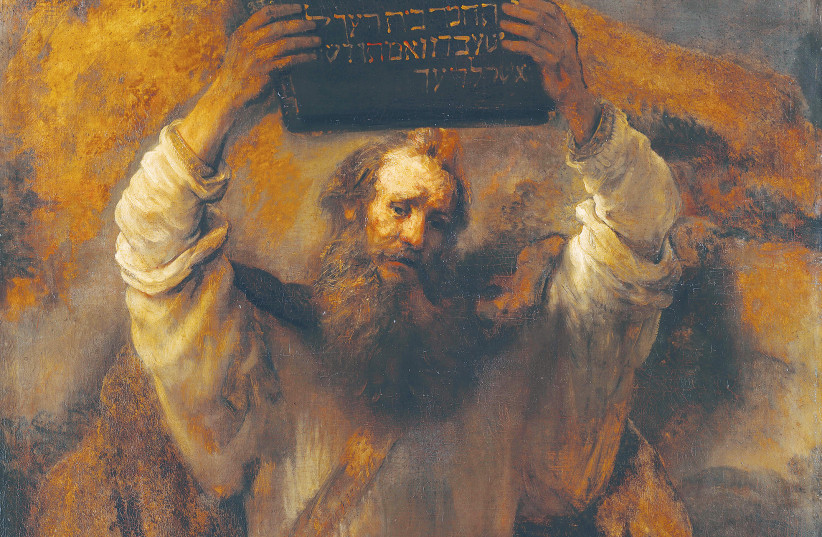As we sat around our Seder reading the Haggadah, eating, singing, drinking, discussing and eating some more, one curiosity haunted us: Where was Moses?
Inexplicably, Moses’s name appears just once in the entire Haggadah, and then only parenthetically, in a direct quote from the Torah, “And the people believed in God and in Moshe His servant.” How can this be? How could we possibly tell the story of the Exodus and omit Moses, the leading man, the star of the show? It is tantamount, say, to telling the story of the rebirth of modern Israel and leaving out Herzl, Ben-Gurion, Menachem Begin and Rav Kook!
And it’s not like there is a dearth of names in the narrative. The patriarchs Abraham, Isaac and Jacob are mentioned, as are Adam, King David, Moses’s brother Aaron and Rabbi Akiva. Moses’s successor Joshua gets a shout-out; why, even the wicked Lavan is mentioned twice, while the villain Pharaoh makes the cut several times. Moses’s name is mentioned no less than 628 times in the Five Books of Moses, yet here, in the one place where he should shine the most, the person who galvanized the nation, courageously confronted Pharaoh and shepherded his flock through the hostile desert is virtually invisible.
How can we do this to him, year after year? Where is our sense of gratitude for all he did for us?
There are several theories as to the Mystery of the Missing Moses. Some conjecture that the compilers of the Haggadah did not want to perpetuate a cult following of Moses, as if he – rather than God – was responsible for the Israelites’ ultimate redemption. And so, just as Moses’s burial place was kept hidden – so it would not become a shrine and Moses worshiped as some kind of demi-god – so is his name purposely omitted.
Others suggest that Moses’s exclusion is intended to stress the sharp transition from our earlier history, when the nation revolved around select, celebrated personalities such as Adam, Noah, the Patriarchs and Matriarchs and Joseph.

Now, as we become a bona fide nation, it is important to move away from spotlighting any one person – even someone as pervasive as Moses – and rather spotlight the people as a whole. Indeed, it is Pharaoh, in the midst of our Egyptian experience, who is the first to refer to us as Am Yisrael, the nation of Israel, as opposed to Bnei Yisrael, the children of Israel.
There is another, rather creative explanation for Moses’s absence from the text. On Passover, one of our essential responsibilities is “to tell the story of the Exodus to our children.” But at that very first Passover Seder, just hours before we left Egypt, all the children were present and so experienced the drama themselves!
In fact, the only children who were absent were Moses’s own sons; they were back in Midian with Moses’s wife Tzipora and his father-in-law Jethro. So perhaps the Haggadah is Moses telling the tale to his children in first-person narration, and in his humility does not want to draw an undue amount of attention to his own role in the saga.
THIS ABOVE all is the hallmark of Moses: humility. God Himself, in a final compliment to His faithful messenger, does not accent his wisdom or courage, unparalleled as they were. No, the Almighty instead pays tribute to Moses as “the most modest man who ever lived.”
For Moses devoted his entire life to his people, with little thought for himself. He shunned the perks of the palace when he joined his brothers; he pleaded with God that someone else be named as leader. Yes, he criticized and castigated the people when they sinned, but he would never, ever abandon their cause. Even after the sin of the Golden Calf, which deeply hurt him, Moses abjectly rejected God’s proposal that the nation be rebooted, beginning anew with him. “If you abandon this People,” says Moses sternly and defiantly, “then blot me out of Your book.”
This humility, this complete negation of the self in service to the masses, is what establishes Moses as the quintessential leader in our history. And it is this devotion to the “other,” this sacred mission to advance the cause of the community even to his own detriment, that gains Moses eternal glory and gratitude. He may be conspicuously hidden in the Haggadah, but his soul permeates every page.
It is perfectly fitting that Moses’s moment of triumph comes on Passover, the holiday of matzot. Like Moses, the matzah is modest, and humble, not “puffed-up” like bread, but singular in its simplicity, in its obedience to a higher cause. The matzah, uniquely, represents the polar opposites of slavery and freedom, repression and redemption. It simulates the meager fare of the masses, while at the same time it testifies to the unyielding inevitability of our devotion and destiny. Moses casts his lot with the downtrodden, and yet rises to the height of spiritual perfection.
Moses sets the bar of leadership high. He sends us the message, across the generations, that a true leader cares very little about himself, seeks no grandiose rewards or acclaim, but instead puts the people high on a pedestal and promotes their wellbeing and welfare rather than his own.
This is the Moses that we salute; this is the Moses-model that we need today, desperately, more than ever before. ■
The writer is director of the Jewish Outreach Center of Ra’anana.
